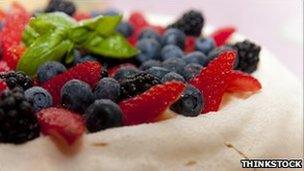Pavlova created in New Zealand not Australia, OED rules
- Published

The Oxford English Dictionary may have settled a long-running argument between Australia and New Zealand over who invented the pavlova.
The dessert - meringue with fruit and cream - was named after the Russian ballerina Anna Pavlova, who visited both countries in the 1920s.
Australians and New Zealanders agree on that, but not on who invented it.
In its relaunched online edition, the OED says the first recorded pavlova recipe appeared in New Zealand in 1927.
This was in a book called Davis Dainty Dishes, published by the Davis Gelatine company, and it was a multi-coloured jelly dish.
But New Zealanders claim the meringue version also originated there, with recipes for it appearing in publications in 1928 and 1929.
Dr Helen Leach from New Zealand's University of Otago is something of a pavlova expert.
"I can find at least 21 pavlova recipes in New Zealand cookbooks by 1940, which was the year the first Australian ones appeared," the author of The Pavlova Story told the Daily Telegraph.
Does it matter?
The Australian claim centres on a recipe by Bert Sachse, a chef in Perth, Western Australia, but that is believed to date from around 1935.
Some might be tempted to ask: does it matter?
The OED is the only English dictionary that aims to trace the first known use of every sense of every word in the English language.
"Linguistically it probably isn't that important," the OED's Fiona Macpherson said about the pavlova ruling. "We have to be neutral about this kind of thing, we're just interested in where we can get the evidence and what it actually means."
But she told the BBC: "It probably does matter, at least if you're from Australia or New Zealand - it's nice to think that you might have coined or created something."
In fact, although the OED credits the first written record of the recipe to New Zealand, it lists the origin, rather ambiguously, as "Austral. and N.Z."
So a ruling has been made, but the debate may well continue.
- Published19 July 2005
- Published1 December 2010